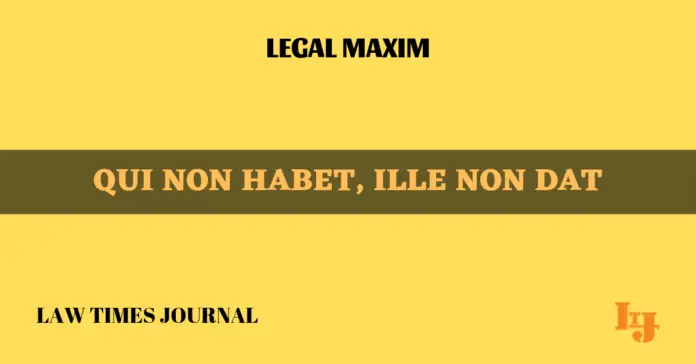
Literal Meaning
He who has not, does not give.
Explanation & Origin
Origin – Qui non habet, ille non dat is a latin term used in the legal language. The term translates as to he who has not, does not give.
Explanation- The above term means that a person who doesn’t have anything can’t give anything. The term can also mean the person is an insolvent or bankrupt as he has no money to give. A person who doesn’t have money can’t give anything nor in legal terms he can’t get into a contract.
Illustration
A bankrupt person can’t give anything because he has nothing left.
Case Reference
In the case of Nagubai Ammal & Others vs B. Shama Rao & Others[1] Proceedings were also taken in execution of the decrees obtained by Chellammal and Srikantamma and of one Appalaraju, and all the properties – comprised in the mortgage were sold and purchased by third parties. It must be mentioned that all the three brothers were adjudicated insolvents on their own application, Brahmananda by an order dated 23-3-1923 in Insolvency Case No. 7 of 1921-22 and Keshavananda and Madhavananda by an order dated 19-2-1926 in Insolvency Case No. 4 of 1925-26. It also appears from the evidence of D.W. 5 that at about this time all of them left the place. We must now examine the several statements which are relied on by the appellants as admissions, ascertain what their true import is, and determine what weight should be attached to them. On 27-6-1932 Abdul Huq moved to the court on the ground of insolvency, for a direction to the Official Receiver to take possession of the mortgaged properties, which were stated to be in the occupation of one Lokiah.
In the case of M. K. Ranganathan And Another vs Government Of Madras[2] This application was based on a report of the Official Receiver in which after setting out the relevant facts he submitted that even though under section 229 of the Indian Companies Act the Company which was admittedly insolvent was governed by rules prevailing with regard to the respective rights of the secured and unsecured creditors and to debts provable and valuation of annuities governing the administration in insolvency and secured creditors generally stood outside the liquidation and were entitled to have the remedy of realising the security and proving before him for the deficiency, if the properties of the Company could be sold for a price higher than the amount due to the Trustees of the debenture holders there was a possibility of a surplus coming into his bands for the benefit of the unsecured creditors. If the Respondent 2 proved before him for any deficiency due to the secured creditors, it would certainly affect the rights of unsecured creditors, and moreover though the secured creditors might realise the security, it will be in the interests of the unsecured creditors to see that a fair and proper price was obtained. He therefore submitted that in the interests of the unsecured creditors it was just and necessary to have a fair valuation ascertained and an enquiry held to ascertain whether the sale by the Respondent 2 in favour of Respondent 3 was bona fide and for a proper price. Respondent 2 filed an affidavit in reply in August 1954 contending inter alia, (1) that the offer by the Respondent 3 was the highest, that he had received and that this had been accepted bona fide, (2) that in the advertisement the condition as to the previous sanction of the Court was inserted because of the undertaking that be had given to the Court.
In the case of Hansraj And Ors. vs Official Liquidators Dehra Dun [3] On the face of them Ss 169 and 171 are wide enough to confer upon the winding up Judge power respectively to stay all proceedings by a secured creditor and to refuse leave to a secured creditor to proceed. The appellant then relies on Section 229. That section provides that in the winding up of an insolvent company (and in this case there is no doubt about the insolvency) the same rules shall prevail and be observed with regard to the respective rights of secured and unsecured creditors and to debts provable and to the valuation of annuities and future and contingent liabilities as are in force for the time being under the law of insolvency with respect to the estates of persons adjudged insolvent. That rule itself, therefore, definitely applies the word “rules” to provisions contained in the Act itself. Finally on the supposition that the word “rules” was to be taken in the sense of rules made under an Act counsel for the respondent was invited to say to what rules made under an Act relating to insolvency the section referred if his interpretation was accepted. Law of insolvency” and not rules which are in force under the law of insolvency.
Edited by Vigneshwar Ramasubramania
Approved & Published – Sakshi Raje
[1] 1956 AIR 593, 1956 SCR 451
[2] 1955 AIR 604, 1955 SCR (2) 374
[3] AIR 1929 All 353





